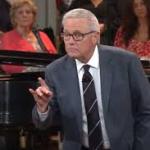The Urban Dictionary defines “knows no bounds” as “An idiom that means something or someone that possesses no limits and will go the extra mile no matter what.”
Therefore, that faith may find in Christ a solid ground of salvation, and so rest in him, we must set out with this principle, that the office which he received from the Father consists of three parts. For he was appointed both Prophet, King, and Priest; though little were gained by holding the names unaccompanied by a knowledge of the end and use.
While the writer of Hebrews did not use the term “offices,” the author of this epistle did unpack their content:
Long ago, at many times and in many ways, God spoke to our fathers by the prophets, but in these last days he has spoken to us by his Son, whom he appointed the heir of all things, through whom also he created the world. He is the radiance of the glory of God and the exact imprint of his nature, and he upholds the universe by the word of his power. After making purification for sins, he sat down at the right hand of the Majesty on high (Hebrews 1:1-3; ESV).
Unlike “Moralistic Therapeutic Deism,” which distorts and reduces Jesus and his significance to that of a “divine butler” and “cosmic therapist,” Jesus is the ultimate revelation, ruler, and reconciler in human history. God has “spoken” finally and ultimately by his Son (Hebrews 1:2); as God’s final word, he is the greatest of the prophets (revelation). God has “appointed” him heir of all things, and he reigns “at the right hand of the Majesty on high” (Hebrews 1:2-3); as such, he is the greatest of kings (ruler). Lastly, God makes “purification for sins” through him (Hebrews 1:3); he is the great high priest (reconciler). Theologians like Calvin and Karl Barth (Church Dogmatics, volume 4) reflected deeply on the meaning and import of these offices, which the writer of Hebrews so masterfully set forth in typological fashion against the Old Testament backdrop throughout his letter.
The author of the epistle to the Hebrews sought to ignite the imaginations of his readers, who were contemplating turning away from Jesus due to persecution. While their blood had not yet been shed (Hebrews 12:4), they had lost possessions and homes (Hebrews 10:34) under Roman rule. Their season of loss far exceeded what we give up for Lent in the West today: “For you had compassion on those in prison, and you joyfully accepted the plundering of your property, since you knew that you yourselves had a better possession and an abiding one” (ESV). Now they were near breaking point, and the writer encouraged and exhorted them not to give up, but to focus their gaze upon the “founder and perfecter of our faith” and remain resilient in their hope:
Therefore, since we are surrounded by so great a cloud of witnesses, let us also lay aside every weight, and sin which clings so closely, and let us run with endurance the race that is set before us, looking to Jesus, the founder and perfecter of our faith, who for the joy that was set before him endured the cross, despising the shame, and is seated at the right hand of the throne of God. Consider him who endured from sinners such hostility against himself, so that you may not grow weary or fainthearted (Hebrews 12:1-3; ESV).
Jesus knows no bounds. He is the great prophet, priest, and king. Whereas David was a prophet and a king, he was not a priest (although he did take “the bread of the Presence” and eat it along with his troops, though it was lawful only for the priests to eat; Matthew 12:1-8). Jesus alone unites all these offices, transcending Moses as prophet (Hebrews 3:1-6), Aaron as priest (Hebrews 5:1-10, and David as King (Matthew 22:41-46).
These Christians who were being bound and persecuted for their faith were tempted to place bounds or limits on Jesus. They may have been tempted to reduce Jesus in significance and return to Moses, Aaron, and David since the Jewish people had not yet lost official sanction for the practice of their faith under Roman rule. And yet, as Hebrews portrays so wonderfully, Jesus fulfills their offices and Messianic longings for his people. Jesus knows no limits. He exceeds our imaginations as the great prophet, priest, and king. And during this season of Lent, the suffering he endured, the blood he shed and life he gave up to cleanse us and conquer sin, guilt and despair reveals his heart of unbounded love.
















